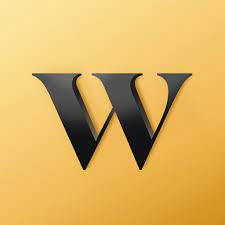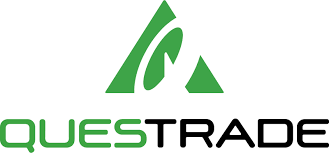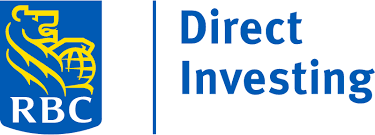![]() What Kind of DIY Investor are you?
What Kind of DIY Investor are you?![]() Things to Consider
Things to Consider![]() Brokerage Pros/Cons
Brokerage Pros/Cons![]() Online Brokerage Quick Chart
Online Brokerage Quick Chart
So you’ve decided you want to be a DIY investor. Great choice! You’re taking your financial future into your own hands.
But now you have to figure out where to invest. There are lots of options out there and I hope this post will highlight how to pick an online brokerage and the main things to look for.
My journey into DIY investing focused on the investment products and on how to save MER fees and I didn’t really consider what online brokerage to use. I banked with RBC, so I went with RBC Direct Investing, which I’ve enjoyed using for the past 10 years.
I’ve also used few more brokerages which are highlighted in this post.
The goal of picking an online brokerage isn’t to be right. You don’t have to make a perfect choice today. The cost to switch brokerages is tiny in the big picture. It’s ok to learn and make changes as you go, that should be expected.
Reduce complexity and take action.
Remember – The most important thing is that you start. You can always make changes along the way!
What Kind of DIY Investor are you?
I previously covered How to Start DIY Investing in Canada, where you can review what kind of DIY investor you want to be.
Depending on the type of investor you want to be, selecting an online brokerage is the next crucial decision.
I have personal experience with each of the online brokerages in this post and I am happy to recommend any of them depending on your situation.
Disclaimer
This post contains referral links.
Here is the list of investor types again for reference:
- The Robo-Investor
- The All-in-One ETF Investor
- The Model Portfolio Investor
- The Dividend/Growth Investor
| Type | Description | Example |
|---|---|---|
| Robo-Investor | An investor who uses automated financial services such a auto-deposit, investment, and rebalancing. | Wealthsimple Invest |
| All-in-One ETF Investor | An investor who buys one broadly diversified index ETF. | VGRO |
| Model Portfolio Investor | An investor who uses multiple index ETFs to build a diversified portfolio. | VCN, VUN, VIU, VEE, VAB |
| Dividend/Growth Investor | An investor who focuses on individual stocks that provide consistent dividend or growth potential. | Apple $APPL |
Things to Consider
- Initial investment amount
- Ongoing investment amount
- Investment Frequency
- Planning to buy ETFs or Stocks
- Brokerage Fees
If you’re just starting out and have a small initial investment, brokerages like Wealthsimple and Questrade are great because they don’t have a minimum investment amount.
If you have a larger portfolio ($15,000+) and will invest large amounts regularly, you don’t have to shy away from the Big Banks as the fees will have little impact on your portfolio.
Investing in ETFs is easy, diversified, and there are brokerages where you can buy them for free. If you want to invest in individual stocks, Questrade is a better option because of the low trade commissions.
Brokerage Fees
I’m a big advocate of cutting your investing fees as much as possible. I focus on the MER aspect of investment fees, but there are brokerages fees to consider.
But don’t let the fees scare you off. If you’re investing over $2,500 at a time, a $9.95 trade is like a 0.40% MER fee. If you’re doing trades on a monthly basis, that works out to only $120 a year. Not very much to be concerned about.
If you plan to invest weekly or bi-weekly, a $9.95 trade cost would add up quickly, especially for smaller investment amounts. For regular contributions, I would recommend a brokerage that offers free ETFs or low commission trades.
Types of Brokerage Fees
- Trading Commissions/Fees. They range from free to $4.95 to $9.95 per trade.
- ECN Fees – Electronic Communication Network fees are a service fee for matching buyers and sellers who trade on their exchange and networks. These are pennies, so not much to be concerned about here.
- Account Fees. Some brokerages charge for smaller account balances.
Brokerage Pros/Cons

Wealthsimple Invest
Recommended for Robo-Investors
Wealthsimple is a financial technology (FinTech) company that offers a robo-advisor platform, as well as a trading platform for ETFs, stocks, and crypto.
Pros
![]() Auto-investing
Auto-investing![]() Auto-rebalancing
Auto-rebalancing![]() Hands-Off Investing
Hands-Off Investing![]() RRSP | TFSA | RESP | Non-reg | Savings
RRSP | TFSA | RESP | Non-reg | Savings![]() Great mobile app and web platform
Great mobile app and web platform![]() Easy sign-up process
Easy sign-up process
Cons
![]() 0.50% MER
0.50% MER![]() Can’t buy individual ETFs or Stocks
Can’t buy individual ETFs or Stocks

Wealthsimple Trade
Recommended for All-in-One ETF and Model Portfolio Investors using Canadian listed ETFs.
Wealthsimple is a Canadian Financial Technology (FinTech) company that offers a robo-advisor platform, as well as a trading platform for ETFs, stocks, and crypto.
Pros
![]() Free ETFs
Free ETFs![]() Fractional Shares
Fractional Shares![]() No account minimum
No account minimum![]() RRSP | TFSA | Non-reg | Crypto
RRSP | TFSA | Non-reg | Crypto ![]() Great for investing small amounts
Great for investing small amounts![]() Regulated Canadian Brokerage for Crypto
Regulated Canadian Brokerage for Crypto![]() Great mobile app and web platform
Great mobile app and web platform ![]() Easy sign-up process
Easy sign-up process
Cons
![]() No RESP
No RESP![]() Not great for USD securities*
Not great for USD securities*![]() 1.5% currency conversion fee*
1.5% currency conversion fee*![]() No Norbert’s Gambit to save currency conversion*
No Norbert’s Gambit to save currency conversion*
* UPDATE 2021-12-08: Wealthsimple has just announced that they will add USD accounts for their Plus subscription. This removes the 1.5% currency conversion fee and costs $10/month. That’s a good feature, but for $120 a year, I feel that USD accounts should be standard. Big thumbs down.

Questrade
Top Pick
Questrade is my top recommendation as it provides the greatest set of features and flexibility. If I was starting out today, I would use Questrade in a hearbeat.
Recommended for All-in-One ETF, Model Portfolio Investors, and Dividend/Growth Investors.
Questrade is a Canadian broker, established in 1999, that offers resident Canadian citizens an alternative to trading and investing with the big banks. Questrade provides trading in stocks, options, bonds, and exchange-traded funds (ETFs).
Pros
![]() Free ETF purchases
Free ETF purchases![]() Can deposit and hold CAD and USD
Can deposit and hold CAD and USD![]() Low commissions
Low commissions![]() Works with Passiv for One-Click Rebalancing
Works with Passiv for One-Click Rebalancing![]() RRSP | TFSA | RESPs | Non-reg | Margin
RRSP | TFSA | RESPs | Non-reg | Margin![]() Great mobile app and web platform
Great mobile app and web platform![]() Easy sign-up process
Easy sign-up process
Cons
![]() $1,000 account minimum
$1,000 account minimum![]() Commissions to sell ETFs
Commissions to sell ETFs![]() Stock trades range from $4.95 – $9.95
Stock trades range from $4.95 – $9.95![]() No fractional shares
No fractional shares![]() 3 day wait to journal for Norbert’s Gambit
3 day wait to journal for Norbert’s Gambit

BMO Investorline
Recommended for All-in-One ETF and Model Portfolio Investors with more than $15,000.
BMO Investorline is a Big Bank online trading platform lets you invest in stocks, ETFs, mutual funds and more! They also provide research, tips and tools.
Pros
![]() 80 Free ETFs
80 Free ETFs![]() Can deposit and hold CAD and USD
Can deposit and hold CAD and USD ![]() RRSP | TFSA | RESP | Non-reg | Margin
RRSP | TFSA | RESP | Non-reg | Margin![]() Linked account with BMO Banking
Linked account with BMO Banking![]() Big Bank quality tools and reporting
Big Bank quality tools and reporting
Cons
![]() $9.95 stock trades
$9.95 stock trades![]() $100/yr account fee (<$15,000)
$100/yr account fee (<$15,000)![]() No fractional shares
No fractional shares![]() Call-in for journalling for Norbert’s Gambit
Call-in for journalling for Norbert’s Gambit

RBC Direct Investing
Recommended for All-in-One ETF and Model Portfolio Investors with more than $15,000.
RBC Direct Investing is a Big Bank online brokerage, that provides ‘self-directed’ investors with direct access to buy and sell investments like stocks, exchange-traded funds (ETFs), mutual funds, GICs and more. RBC Direct Investing also offers a wide range of tools to support investors.
Pros
![]() Can hold CAD and USD
Can hold CAD and USD![]() RRSP | TFSA | RESP | Non-reg | Margin
RRSP | TFSA | RESP | Non-reg | Margin![]() Auto-journalling for Norbert’s Gambit
Auto-journalling for Norbert’s Gambit![]() Linked account with RBC Banking
Linked account with RBC Banking![]() Big Bank quality tools and reporting
Big Bank quality tools and reporting
Cons
![]() $9.95 trades
$9.95 trades![]() No Free ETFs
No Free ETFs![]() $100/yr account fee (<$15,000)
$100/yr account fee (<$15,000)![]() No fractional shares
No fractional shares
Online Brokerage Quick Chart
Below are highlights of features and fees for each brokerage.
| Brokerage | Free ETFs | Fractional Shares | Trading Fees | ECN Fees | Account Minimum | Account Fee |
|---|---|---|---|---|---|---|
| Wealthsimple Invest | – | – | – | – | $0 | $0 |
| Wealthsimple Trade | Yes | Yes | – | – | $0 | $0 |
| Questrade | Yes, purchases | – | $4.95 – $9.95 | Yes | $1,000 | No |
| BMO Investorline | – | – | $9.95 | – | $15,000 | $100/yr |
| RBC Direct Investing | – | – | $9.95 | – | $15,000 | $100/yr |
Each brokerage has its strengths and weaknesses. Relating back to the different DIY investors, I’ve rated each for how well they fit.
| Brokerage | Robo-Investor | All-in-One ETF Investor | Model Portfolio Investor | Dividend/Growth Investor |
|---|---|---|---|---|
| Wealthsimple Invest | Great | – | – | – |
| Wealthsimple Trade | – | Great | Great | OK |
| Questrade | – | Great | Great | Great |
| BMO Investorline | – | Great | Great | OK |
| RBC Direct Investing | – | OK | OK | OK |
Noticible Exclusions
There are a number of online brokerages I’ve haven’t mentioned as I don’t have personal experience with them.
- National Bank Direct Brokerage – recently added free transactions on all ETFs and stocks to their offering. That’s HUGE!
- Interactive Brokers – Advanced platform and better lending rates for margin accounts.
Final Thoughts
I hope this post answered some of your questions on how to pick an online brokerage. To reiterate, you don’t have to get it right on the first try. Don’t fall into analysis paralysis (inability to make a decision due to over-thinking a problem).
My advice would be to just do it!

Let me know in the comments if there are other factors you look for in an online brokerage that I missed.
Best of luck in your investing journey!
National Bank Direct Brokerage – recently added not just free ETFs but free CAD and USD Stocks to their offering.
Ok great. I’ll add that note. Thanks!